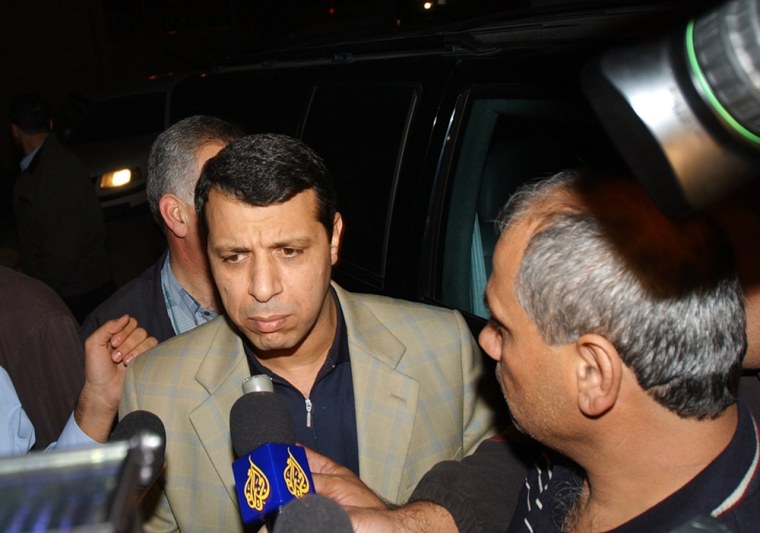On the eve of a seismic juncture in Mideast politics, Mohammed Dahlan fielded calls on a cell phone whose number is known only to the top Palestinian leadership. One call was from Ahmed Qureia, the prime minister.
The phone rang again. It was Mahmoud Abbas, the former prime minister. And then Rauhi Fattouh, the speaker of parliament, called in.
Hours later, on Thursday morning, Palestinian leader Yasser Arafat was pronounced dead in a Paris hospital. In quick succession, Abbas was selected to replace Arafat at the helm of the PLO. Fattouh was confirmed as interim president. And Qureia arranged to accompany Arafat's body home from Paris.
And Dahlan?
In the most significant shift of power in the Palestinian struggle for a state, Dahlan emerged without a job. At least officially. The phone of the Palestinian power broker is still ringing.
No title needed
Dahlan is an enigma moving among the Byzantine structures of the government of Arafat, who was a master at rewarding and thwarting rivals to keep them at bay. Even without an official title, little happens here without Dahlan's involvement.
U.S. peace negotiators are close to Dahlan and consider him a key figure in a future Palestinian state, perhaps even as prime minister. And while Washington's blessing can be the kiss of death in Mideast politics, Dahlan has managed to keep a strong following on the Palestinian street. More important, at 41 he's decades younger than any of his potential rivals, like Abbas and Qureia.
Eschewing the trappings of Palestinian power, like luxurious villas in the hills of Ramallah, Dahlan, originally from the Gaza Strip, lives and works out of a two-room hotel suite. Machine gun-toting sentries guard the doors and hallway.
"Come on," he said, smiling, when asked about his political aspirations. "I've heard people talking about that, but I'm not looking to be the prime minister. I'm serious on that point. I want to be a bridge or someone who will sustain the law and sustain the stability here."
Convincing argument
Dahlan makes a convincing argument, and one that resonates well with both American and Israeli officials. Last year, when President Bush sought to marginalize Arafat by pressuring the Palestinians to reform the government, Dahlan was named interior minister under Abbas. But Abbas and Dahlan quickly resigned after falling out with Arafat, who refused to grant them wide security powers to crack down on militancy.
The Israeli daily Ma'ariv on Friday quoted Israeli security officials saying they were encouraged by Dahlan, whose willingness to take on militant groups like Hamas and Islamic Jihad, showed "positive potential."
"I think we need just to speak with the people in a frank way," Dahlan said, referring to the militias. "First of all, to give them the feeling that they are part of the authority, they are not against the authority and we will not act against them."
Although keen to restart peace talks, some of Dahlan's solutions don't go down will with the Israelis. He maintains the only way to rein in militants is by offering them immunity from Israeli prosecution.
"If we can gave them good life, then they will in the future be part of the authority," Dahlan said. "It will be difficult but not impossible."
Reform first
Dahlan admits that the success of any future negotiations is also dependent on Palestinian reform.
According to Palestinian law, elections must be held within 60 days after Arafat's death. Abbas, the former prime minister and a close confident of Dahlan, is considered most likely to win the presidency.
"Over the last 35 years, we didn't really impose law and democracy on the Palestinians. It was always either the PLO or, lately, the Palestinian Authority. We must not accept anyone as a leader unless they are elected democratically.
Dahlan says elections are the "quickest way for Palestinians to survive."
In a rare interview, Dahlan spoke about his relationship with Arafat, who considered him a protégé but didn't hesitate to manipulate him like other potential rivals. Dahlan's power base today is derived from running Arafat's Fatah party in the Gaza Strip.
On the eve of Arafat's departure to the Paris hospital where he died Thursday, the late Palestinian leader sent Dahlan a communiqué appointing him as national security adviser — a final vote of confidence in Dahlan.
But the independent Dahlan wasn't willing to be a pawn in Arafat's last game of political chess. He scribbled his refusal directly on the letter from Arafat, and returned it to him. "Chairman Arafat looked at that and smiled," Dahlan said.
"Then Chairman Arafat folded the paper, put it in his pocket and said, 'I'm taking this to Paris with me,'" Dahlan said.
